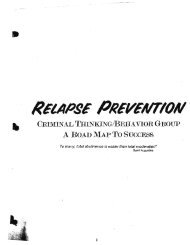In addition, delaying treatment until after sex offenders have served their full prison terms and thenimposing it on them may well be counter-productive. n184 Professor Winick observes:Treatment delivered nearer in time to the offense is more likely to be effective. Inasmuch as some sexoffenders have a false ideation concerning the circumstances of their crime, the passage of a long period oftime only solidifies this self-deception in ways that make it more difficult to break down. A delay intreatment (or in what presumably is the more effective treatment that specialized sexual predatorcommitments an offer) can further rein<strong>for</strong>ce the offender's deviant attitudes and behavior patterns makingthem more chronic. Clinical considerations thus strongly counsel against such a delay in treatment. n185[*402]In outlining these potential antitherapeutic effects Professor Winick seemingly assumes that the state hasenacted a bona fide treatment regime and that a primary purpose of this scheme is the rehabilitation of sexoffenders so that they may eventually be released into the community. n186 However, another viewpointof the state's goal may be more accurate. A persuasive case can be made that the legislature actuallyintended to create a punitive regime that would have an antitherapeutic impact on individuals committedunder the predator law. n187 If so, there is strong evidence that the state has succeeded. n188 It is badenough that the sexual predator law delays treatment until after the offender has served his full prison term<strong>for</strong> the offense. In Washington, the failure of the state to provide adequate treatment <strong>for</strong> almost nine yearsafter its law went into effect makes matters even worse because the state has significantly increased thedelay with the resulting loss of treatment opportunity.B. Gulag CultureIn Washington State, most of the initial staff were "inexperienced in the treatment of sex offenders." n189Instead, they received minimal on-the-job training. This approach was taken because it would have beentoo expensive to hire qualified staff who were knowledgeable in treating sex offenders. n190 As describedabove, professionals certified to treat sex offenders do not staff the treatment program nor does the SCCcurrently provide constitutionally adequate treatment. n191 SCC residents recognize that the staff isprofessionally unqualified to treat sex offenders and that the treatment programs being offered are minimaland do not comply with professionally acceptable standards.As noted earlier, no on-going transitional release program is in place at SCC. n192 Only five individualshave been released to less restrictive placement in the community, and most of these were court-orderedover the objection of staff [*403] and prosecutors. n193 To date, staff has not recommended placing anyresident into a transitional release program. n194The failure of staff to recommend release and the inability of a single resident to obtain final release duringthe past eight years provides a counter-incentive <strong>for</strong> residents to participate in whatever treatment isavailable. Residents rationally understand that their bona fide attempts to change their attitudes andbehavior <strong>for</strong> the better will not increase their chances to earn their eventual freedom.Based on this record sex offenders committed under this law have no reason to expect they will ever bereleased. Their hopelessness is well grounded. It is hard to imagine a prison or a culture more like theRussian Gulags. n195 This hopelessness in turn must cause unremitting pain <strong>for</strong> SCC residents. Theysurely understand the reality of this special <strong>for</strong>m of 'civil' commitment; it is virtually a life sentence. It isimpossible to imagine how residents must feel when they read judicial opinions that simply accept andrecite the official narrative n196 that the state provides treatment to individuals committed under theselaws. n197C. No <strong>Therapeutic</strong> Alliance
There is minimal trust between staff and patients. This situation has existed from the very outset. In a reportcompiled shortly after he visited the SCC on December 16, 1991, Dr. Vernon Quinsey, an internationalexpert on sex [*404] offender research, wrote a report <strong>for</strong> the Washington State Institute <strong>for</strong> Public Policy.He noted:The nature of the <strong>Sexual</strong>ly Violent <strong>Predator</strong> Legislation is in itself not conducive to inspiring motivation <strong>for</strong>treatment among residents. Residents perceive the law to be arbitrary and excessive. This perceptioncertainly appears justifiable in cases where residents have actually been on the street and have beenrecommitted without parole violation and/or have sought treatment while serving their regular sentencesand been denied it <strong>for</strong> a variety of bureaucratic reasons (e.g., length of sentence). It is, of course, extremelydifficult to <strong>for</strong>m a therapeutic alliance with an embittered clientele. n198Until very recently, the staff had not recommended that a single resident be placed in a less restrictiveplacement, let alone released outright. n199 In his 1992 report Dr. Quinsey stressed how important it was<strong>for</strong> treatment efficacy that some residents see that treatment can lead to release. He wrote, "Until someresidents actually secure their release as a result of treatment induced changes, it will be extremely difficultto convince residents that a therapeutic release route is feasible." n200 It should come as no surprise thatthere is minimal possibility of <strong>for</strong>ming a therapeutic alliance between the treatment providers and patients.It is vital that patients believe that their treating therapists sincerely want to help them improve and bereleased. To achieve this end, patients must also be willing to trust their therapists with intimate knowledgeabout themselves. Without such an alliance, treatment prospects are dim. n201 It is hard to imagine moredifficult circumstances <strong>for</strong> <strong>for</strong>ming an effective therapeutic alliance between clinician and patient thanthose that exist at the SCC.D. The Depersonalizing Effect on StaffIn his insightful article, Professor Winick has explored a number of ways that sexual predator laws mayhave a negative effect on clinicians who work as therapists in facilities <strong>for</strong> sexual predators. n202 Henotes that patients coerced into treatment may only participate in a <strong>for</strong>mal way and may not have themotivation and commitment necessary <strong>for</strong> successful treatment. This may create frustration <strong>for</strong> [*405]therapists. n203 The ethics codes of several mental health professional groups stress that treatment shouldbe provided on a voluntary basis and raise serious concerns about the propriety of treating patients againsttheir will. This may present ethical concerns <strong>for</strong> clinicians. n204 Again though, Professor Winickseemingly assumes that therapists working in these facilities are genuinely interested in rehabilitating sexoffenders. n205In Washington, the SCC was initially staffed with individuals untrained and inexperienced in treating sexoffenders. n206 Moreover, because of the context in which the predator law was enacted and the punitiveintent behind the law, many staff viewed themselves primarily as custodians of dangerous and intractableoffenders. n207 Staff looked down on the patients and treated them even worse than criminals. Indeed,staff often treated residents not as patients but rather as objects deserving scorn and abuse. n208A state judge specifically found that "SCC staff have verbally abused residents, making derisive commentsabout residents' status or race," and "staff have requested a resident to harm other staff." n209 Anotherstate judge found that SCC staff have verbally abused residents by deriding both their status (calling themnames like "rapo," "pervert," and "fucking punk") and their race (calling them names like "niggers, niggerlawyer," "sand niggers," and "sand monkeys"). n210 Staff has mimicked a Native American dance in frontof a Native American resident. n211 It is incomprehensible that the staff in a treatment facility wouldmanifest such a derogatory attitude toward patients committed to their care. However, this unexpectedphenomenon provides some empirical support <strong>for</strong> Professor Winick's concern that "clinicians <strong>for</strong>ced towork in these [sexual predator] programs may there<strong>for</strong>e perceive themselves more as jailers than astherapists." n212 [*406]E. Effect on Judges and the Police
- Page 3 and 4: This Article will demonstrate that
- Page 5 and 6: In its findings, which were enacted
- Page 7 and 8: esidents cannot use the SCC grievan
- Page 9 and 10: In her reports, the special master
- Page 11 and 12: shortly after the law went into eff
- Page 13: The Kansas experience confirms that
- Page 17 and 18: For example, to satisfy its concern
- Page 19 and 20: TJ must develop a normative philoso
- Page 21 and 22: n6 David B. Wexler, New Directions
- Page 23 and 24: n34 See, e.g., Wash. Rev. Code § 7
- Page 25 and 26: n58 See DSM-IV, supra note 30, at 6
- Page 27 and 28: n82 See Thirteenth Report of the Sp
- Page 29 and 30: n110 Eleventh Report of the Special
- Page 31 and 32: commitment. See Wash. Rev. Code Ann
- Page 33 and 34: n171 See, e.g., Briefs of the State
- Page 35 and 36: and the bond formed between them. T
- Page 37 and 38: in predatory acts of violence if no
- Page 39 and 40: deprives one charged with a crime o
- Page 41 and 42: Time of Request: Wednesday, July 04
















